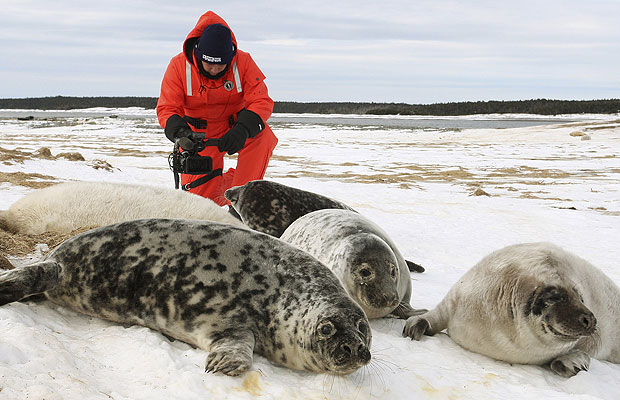Free trade with Europe could hinge on oilsands, seal hunt

Montreal Gazette | February 10, 2011
Free trade with Europe could hinge on oilsands, seal hunt
By Postmedia News Europe Correspondent, Peter O’Neil
PARIS — Sealing and oilsands, two issues that have darkened Canada’s image in some sectors of European society, could affect ratification of the proposed Canada-European Union free trade agreement, suggests a report from the House of Commons parliamentary committee on trade.
The report, based on a fact-finding mission to Europe in November, recommends that the Canadian government and Parliament step up efforts to lobby the 736-seat legislature that now has veto power over EU trade agreements.
The MPs heard complaints on matters that had nothing to do with the proposed Comprehensive Economic and Trade Agreement (CETA), such as Canada’s seal hunt and the imposition of visa requirements on citizens visiting Canada from a small number of EU countries.
"The committee heard that Canada must develop a better communications strategy on sensitive issues like the seal hunt and the visa requirement for nationals of certain European countries," the all-party committee said in the report tabled Wednesday.
"Although these irritants are not part of the CETA negotiating agenda, they could affect ratification of any future agreement."
The European Parliament, which holds sessions in Brussels, Belgium and Strasbourg, France, gained veto powers over trade deals in the Lisbon Treaty that took effect in 2009.
Canada is hoping to announce later this year an agreement-in-principle that would slash tariff and non-tariff barriers that affect trade and investment.
Some members of the European parliament (MEPs) who met with the Canadian committee in Strasbourg "expressed the hope that the CETA would encourage responsible extraction and use of these raw materials, and said that both parties should be required to guarantee a high level of environmental protection," the report noted.
"Other European parliamentarians said they are confident that Canada will do just that, considering the evolution in extraction methods, which are today more efficient and more respectful of the environment than in the past."
A separate opinion by New Democrat MP Peter Julian said European parliamentarians feared that CETA would lead to increased oilsands production and would therefore "worsen its devastating impact on the environment."
Robert Sturdy, a veteran British Conservative MEP and vice-chairman of the European Parliament Committee on International Trade, said Thursday that Canada has been the target of environmentalists, animal rights activists and their parliamentary allies since he was elected in 1994.
First it was clear-cut logging and animal trapping, then it was the seal hunt before the European Parliament banned seal product imports in 2009, and now it’s Alberta’s so-called "dirty" oilsands sector, he said.
"Whether it will stop the vote, I certainly hope it doesn’t, but we don’t know yet, until we start with an agreement and start discussing it fully and working on it. Then we’ll get a better idea."
Conservative MP Gerald Keddy, parliamentary secretary to Canadian Trade Minister Peter Van Loan and a member of the committee that visited Europe, said he doesn’t share the view of other MPs who fear environmental or animal rights issues could interfere with ratification.
But he said Ottawa has to put greater effort into lobbying the European members.
"We can’t ignore them," Keddy told Postmedia. "We have to understand and recognize that there are important differences between the EU and Canada, but that doesn’t mean we can’t sign a complementary agreement that benefits both countries."
The European Parliament will have its final vote on the EU-Korea free trade deal, which is the first to be ratified since the Lisbon Treaty.
"The experience of ratifying Korea has shown that any given bilateral issue, small or large, could become an issue for debate, often based on thin facts and fearmongering," said Brussels-based trade analyst Hosuk Lee-Makiyama.
"However, the MEPs are less subject to populist sentiments than some may have feared. There is a solid majority of conservatives, liberals and social democrats who by far outnumber the nuts on the fringes."





